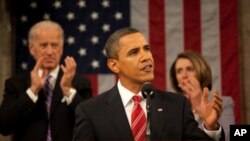President Barack Obama's State of the Union Address has now formally been scheduled for January 25. The shootings in the U.S. state of Arizona, and the national debate they have sparked, are going to figure in what Mr. Obama says two weeks from now in his speech to a joint session of Congress.
The president and his White House staff have been preparing for the State of the Union Address for months, with drafts being revised using input from a range of sources within and outside of government.
The January 25 date has been known for some time, but it was not until Tuesday that a letter went to the president, from the new Republican House Speaker John Boehner, formally inviting him to deliver the address.
In the letter, Boehner refers to the shootings in Arizona, saying that even in the wake of tragedy, Americans "must never waiver from our obligation to carry out their will and provide solutions to keep moving our nation forward."
The address will take place almost exactly two weeks after Mr. Obama's visit to Tucson, Arizona where the suspected gunman killed six people and left 14 others wounded.
Among the wounded is Congresswoman Gabrielle Giffords, who though she is expected to live, faces years of recovery from a gunshot wound to the head suffered as she was meeting with constituents in Tucson.
Sentiments that President Obama expresses at a memorial service in Tucson on Wednesday are likely to find their way into the speech he delivers to Congress and the nation on January 25.
Mr. Obama provided a sample of the kind of message he is likely to deliver in the State of the Union when he spoke to reporters Monday amid talks with visiting French President Nicolas Sarkozy.
"I think it is going to be important I think for the country as a whole as well as the people of Arizona to feel as if we are speaking directly to our sense of loss, but also speaking to our hopes for the future, and how out of this tragedy we can come together as a stronger nation," said President Obama.
The State of the Union Address will come amid ongoing heated debate about the motives of the accused shooter, and though there is no evidence to this effect so far the extent to which the heated political rhetoric in the nation may have contributed to his state of mind at the time.
Particularly in light of the events in Tucson, the president is likely to speak strongly about the need for greater civility in the national discourse, and urge people across the political spectrum, and in the media, to think about the impact that words can have.
White House aides say drafts of the State of the Union are already being revised because of the Arizona tragedy. But whether it is that or what Mr. Obama says in laying out his vision for the next two years, he will be placing his personal stamp on the product his speechwriters come up with.
In doing so, he may also make use of observations of other current and former political figures who have spoken in recent days, one of them former President Bill Clinton.
In an interview with the BBC that aired on Tuesday, Mr. Clinton urged Americans not to allow political differences to "degenerate into demonisation" and suggested that the House of Representatives, now controlled by Republicans, should be the place where the process of toning down the political discourse starts.
Arizona Shootings Impact Obama State of the Union Address
- By Dan Robinson





